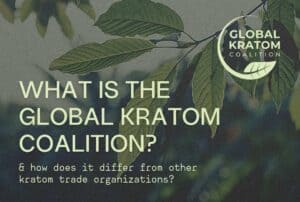On December 13, 2023, the American Kratom Association (AKA) organized a Congressional Briefing on Kratom Science and Policy in Washington, D.C. Following the briefing, the AKA hosted a reception to honor members of the kratom advocacy community.
Purpose of the Congressional Briefing on Kratom Research in Washington, D.C.
The AKA held the briefing to update legislators on the most recent kratom research. Ultimately, the goal was to garner more Congressional sponsors and support for the Federal Kratom Consumer Protection Act (KCPA). Bipartisan sponsors introduced this bill in both the House and Senate in early October of this year.
Approximately 19 U.S. states have created regulations for kratom products, but no federal regulations on the manufacture and sale of kratom exist. The new bill would set the stage for such regulations to be enacted. Importantly, it would remove the roadblocks put in place by the FDA that have hampered consumer protection efforts in the past decade.
Policymakers have raised many questions about the scientific and sociological foundation that such legislation is based upon. Should kratom remain legal if it is not yet thoroughly researched? Are some kratom products more dangerous than others? Can we create good kratom policy while we wait for more research on kratom’s safety? During the briefing, researchers directly answered these questions.
“For people who find kratom to be a lifeline… we shouldn’t take it away. That would be like taking away a life preserver from somebody that’s struggling in the ocean because it’s not Coast-Guard approved.”
— Dr. Jack Henningfield
Mac Haddow, head lobbyist for the American Kratom Association, introduced a panel of kratom experts and researchers at the briefing. Each panelist updated legislators on unique areas of kratom research and their suggestions for how this should affect policy.

The AKA’s goal, Haddow explained, was to, “empower the voices of independent scientists because we believe that science should dictate public policy on kratom.”
NIDA Director Dr. Nora Volkow Emphasizes the Need for Oversight and Continued Research
The first panelist to speak was Dr. Nora Volkow. Dr. Volkow has been the Director of the National Institute on Drug Abuse (NIDA) since 2003. “I love that concept about how policy should be based on science. And when I was first starting to do research… there was no questioning about it,” she said.
Dr. Volkow then elaborated, “And then I came to NIDA and I realized that science is not necessarily sufficient or enough to guide policy. So my perspective on all of this is ‘how can we work together so that the knowledge that we have can be used ultimately for policy?’“
Dr. Volkow discussed pre-clinical research and the context in which people consume kratom in the United States. Through surveys of consumers, NIDA has found that people use kratom for a wide range of mental and physical benefits. Additionally, people consume it as a more mild substitute for other compounds.
Her overall message was that we have a large amount of anecdotal evidence and preliminary scientific evidence which demonstrate the benefits of kratom. This is especially true in comparison to other substances people consume for the same reasons. However, we still have a great deal to learn about kratom and its components. At present, we need oversight and clinical research to fully understand kratom’s value to consumers.
Public Health Scientist Dr. Jack Henningfield Explains the Consequences of Banning Kratom
Next to present was Dr. Jack Henningfield, a biomedical and public health researcher. Dr. Henningfield works for PinneyAssociates, a consulting firm that aids companies in drug development and positioning. He reiterated much of the information presented by Nora Volkow.
Henningfield also touched upon the growing concern people have about plain leaf kratom versus kratom extracts. Many people have a general notion that extracts are bad for consumers.
However, Dr. Henningfield pointed out that products like coffee are technically extracts. The issue with kratom extracts, according to Henningfield, is not just the method of processing. Rather, it is that research into the safety and efficacy of these extracts is not done before they are brought to market. Further, the labeling that accompanies these kratom products is insufficient.
Related: Kratom Lawsuits Cite Serious Issues with Kratom Product Labeling Practices
He also petitioned for regulating the amount of alkaloids in kratom products. In particular, Dr. Henningfield believes regulators should consider creating a legal maximum concentration of certain alkaloids.
Who Should Be Responsible for Regulating Kratom?
Dr. Henningfield strongly advocated for FDA regulation. However, the FDA has historically been unwilling to engage judiciously in any efforts to enhance kratom consumer protection.
In spite of these issues and the lack of regulation, Dr. Jack Henningfield’s view is that kratom should remain legal and accessible. “For people who find kratom to be a lifeline… we shouldn’t take it away. That would be like taking away a life preserver from somebody that’s struggling in the ocean because it’s not Coast-Guard approved. You just don’t do that,” Dr. Henningfield expounded.
Professor Kirsten Smith Highlights How U.S. Kratom Consumption Differs from Traditional Practices
Dr. Kirsten Smith is an assistant professor at Johns Hopkins University. She previously participated in NIDA’s intramural research program, and has since become a scientific advisor to the International Plant and Herbal Alliance. Dr. Smith also advises the Kratom Coalition, a nascent kratom advocacy group somewhat like the American Kratom Association.

Dr. Smith started out by explaining to legislators how American kratom consumption diverges greatly from traditional kratom practice.
She displayed a photo of kratom trees—similar to a photo you’d find on almost every vendor website. However, “the fresh leaves that are used in Asia are not what we’re using here.”
Aside from kratom tea made with crushed leaves, there are no products on the U.S. market that mirror traditional consumption methods. That is not to say that unorthodox formulations are inherently dangerous. However, these new products’ safety profile can’t just be extrapolated from the safety profile of traditional tea.
Unfortunately, a number of kratom companies have done just that. These companies have made unsupported claims about the safety of new kratom products based on the historical safety of entirely different ones.
Dr. Smith echoed Dr. Henningfield’s point that kratom regulation is made more complex by the wide range of formulations. “When we say ‘kratom,’ we are talking about dozens of things, and it’s very difficult to study real world kratom use because, again, the measurements differ and the products differ.” Thus, the work for researchers and regulators has become quite daunting.

What Do Kratom Consumers Look Like? Who Would Be Protected By Federal Kratom Regulation?
The demographics of people that consume kratom and the reasons they consume the plant are more varied than the products themselves.
Dr. Smith explained that on average, most kratom consumers surveyed are in their mid to late 30s, non-hispanic white, and have a high school diploma or advanced degree. There is an even split in the number of male and female-identifying consumers.
Most people who consume kratom regularly have already been doing so for many years. Some consumers have been consuming kratom for over a decade. People utilize kratom for relief, motivation, productivity, mood, improved athletic ability… The list goes on.
Dr. Smith reported that a very small number of people have issues with reliance on kratom or difficulty with ceasing their consumption. However, she reported, “what we don’t see in any of the work thus far are psychosocial impairments in daily functioning, giving up important activities, or hazardous use.”
Like the prior panelists, Dr. Smith concluded that her opinion of the best path forward is through continued research and immediate regulation, especially in light of the proliferation of new kratom products.
“Please give more money to NIDA.” Dr. Smith’s comment drew supportive laughter from the crowd, but her plea was quite serious.
Forensic Toxicologist Dr. Marilyn Huestis Dives Into How Kratom Is Misrepresented in Adverse Event Reports
Dr. Marilyn Huestis, a former researcher at NIDA, gave an overview of the current understanding of the active alkaloids found in kratom leaves and products. She explained that healthcare professionals and medical examiners often wrongly attribute adverse events to kratom. Further, adverse events which involve kratom alone are very rare occurrences.
She highlighted the fact that mitragynine, the presumed primary active alkaloid in kratom, does not seem to produce the negative side effects that are caused by other compounds which are active at the same receptor sites.
Though many other scientists corroborate Dr. Huestis’ conclusions, a few contend the assumption that mitragynine and 7-hydroxymitragynine are responsible for most of kratom’s effects. A growing number of kratom experts believe more attention needs to be paid to less-prevalent alkaloids and non-alkaloidal components of kratom.
How Might Updated Knowledge of Kratom Alkaloids Affect Policy Decisions?
Dr. Huestis explained that 7-hydroxymitragynine is actually a metabolite of mitragynine. It is produced after leaves are harvested, “but it is not present in fresh kratom leaves.” This point has a few large and small implications for kratom regulation.
For example, a few state regulatory acts define kratom as a tree containing mitragynine and 7-hydroxymitragynine. Such wording could become a loophole which vendors exploit to avoid following regulations.
On top of the reasons given by the other panelists, Dr. Huestis advocated for regulation to prevent adulteration of kratom products with additional kratom alkaloids or other substances. She reiterated that medical examiners and forensic laboratories need to improve their understanding of kratom products. Currently, they are significantly over-emphasizing the role of kratom alkaloids in adverse events.
Former Drug Czar Jim Carroll Looks to Personal Experiences to Provide Kratom Policy Recommendations
The final panelist was James (Jim) Carroll. Carroll was the Director of the White House Office of National Drug Control Policy (ONDCP)—a position also referred to as “Drug Czar”—from 2019 to 2021.
“I offer that I’m not testifying today or speaking today based on my experience at ONDCP alone. I’m also talking today as the parent of a child who is in recovery from a dependence on opioids,” Carroll explained.
Jim Carroll started his career as a drug prosecutor. He originally supported the FDA’s 2016 attempt to schedule kratom. However, he came to realize that criminalization was not the best way to help people who are struggling.
How Can Legislators Create Beneficial Policy without Findings from Clinical Research? Main Takeaways from the Congressional Briefing on Kratom Science
The science on kratom products is not nearly perfect or complete—and it will never be. This isn’t a status unique to kratom. “Regulation always starts before you know everything,” Dr. Henningfield conceded.
Regardless of the current state of research, Congress still has the ability to create policy that enhances Americans’ wellbeing. At the moment, this policy cannot be dictated purely by findings from clinical research. Thus, social and historical context can play a significant role.
We can learn not just from past U.S. and international policy regarding kratom, but also from policy regarding other compounds which people use in similar contexts.
Related: Kratom in Czechia: New Category “Psychomodulating Substances” Advances International Regulation
Americans have time and again seen prohibitionist policy cause more harm than good on massive scales. Prohibition of many substances has led to underground sales with no oversight, no quality control, and inadequate consumer education.
On the other hand, regulation can establish higher quality standards, enhanced consumer safety, and public education. This path also enables continued research into kratom which can better inform policy in the future.
Advocate Support for Congressional Participation and Federal Kratom Bill Sponsorship
Researchers and policymakers were not the only voices in the room at the Congressional Briefing on Kratom Science and Policy. Advocates of all kinds—from long-time consumers to laboratory technicians to vendors to anti-prohibitionist allies—gathered at the capitol to aid the AKA in garnering support from Congress.

Advocates went door-to-door through Senate and House buildings to speak with elected officials about the briefing, and asked them to consider sponsoring the Federal Kratom Consumer Protection Act.
AKA Reception Honored Individuals Who Have a Lot at Stake In the Fight to Regulate Kratom
On the evening of December 13, the AKA hosted a reception for advocates and Congresspeople. They celebrated advocates’ collective efforts, while also spotlighting individual stories.
Mac Haddow introduced Misty Brown, Julian Price, and Shaina Brown, whose experiences illustrate the profound and challenging impact of current kratom policies on real lives.
Julian Price and Shaina Brown Address Advocates in Washington, D.C.
Julian Price is the daughter of Marshall Price, who passed away at the end of 2022. Marshall Price purchased kratom legally in Missouri. He was then arrested for kratom possession and trafficking while driving back to his home in Arkansas, and later sentenced to 10 years in prison. Prior to the start of the sentence, on December 8, 2022, Marshall Price died in the Greene County jail under suspicious circumstances.
Shaina Brown was arrested for possession and trafficking of kratom in Alabama on April 1, 2023. She had purchased the kratom in Florida, where it is legal. She was then arrested after driving a few hundred feet over the (unmarked) Alabama border.
Shaina Brown’s bond was originally set at $1 million. 7 months later—just a few weeks before the briefing—advocates were finally able to bail her out of jail after her bond was reduced to $75,000.
Julian and Shaina expressed gratitude for the advocacy work of the kratom community. These two women and their families were brutally harmed by kratom criminalization. Their personal stories further highlight the need for judicious kratom policies that help consumers rather than criminalize them.
Now, Julian and Shaina add their voices to the chorus of advocates fighting tirelessly for kratom consumer protection.
AKA Kratom Advocacy Efforts Continue in Tampa, Florida
The American Kratom Association isn’t finished with its advocacy efforts in 2023. On December 19, they are hosting a rally and press conference outside the offices of the Tampa Bay Times.
The Florida news outlet recently released a series called “Deadly Dose.” The series presents a one-sided view on kratom, focusing predominantly on negative consumer experiences.
While the series includes some well-researched information, it falls short in representing the broader picture of kratom use. It heavily leans on sensationalized and fear-mongering headlines, overshadowing the fact that many consumers report positive impacts of kratom on their lives.
Changing the Narrative to Fairly Represent Kratom and Kratom Consumers
The Congressional briefing on kratom marks another significant step forward in the conversation surrounding kratom regulation. The discussion underscored the need for more scientific research—particularly clinical studies—to understand kratom’s effects fully.
As the AKA continues its advocacy efforts, the focus shifts to ensuring balanced representation in media narratives. These efforts have an indirect but important impact on policy, and will hopefully contribute to de-stigmatizing kratom and its consumers.
In light of the Congressional Briefing on Kratom Science and Policy, and the ongoing advocacy efforts, it’s clear that the path forward for kratom regulation hinges on science-based policies and a balanced public discourse.
If you’re interested in supporting consumer protection by advocating for the Federal KCPA, you can find more resources on the Top Tree Herbs KCPA advocacy giveaway page and the ProtectKratom.org website.





